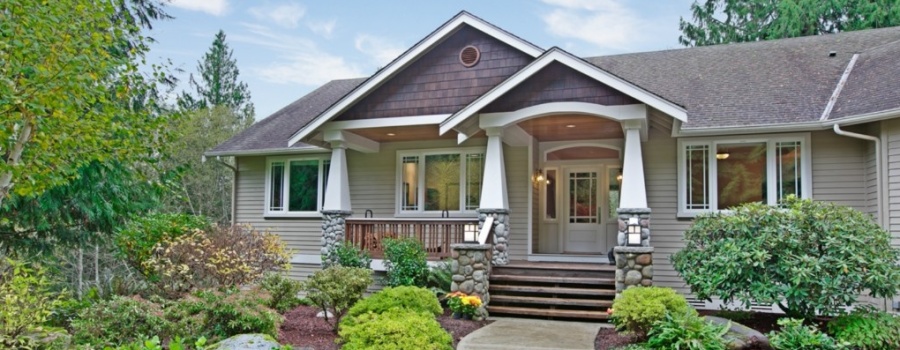How to Know You're Ready For a Bigger House
By Geoff Williams and Annalisa Burgos, FrontDoor.com
When your family (or income) has outgrown your home, it's time to go bigger and better.
Television viewers of a certain age remember The Jeffersons and its theme song: “We’re movin’ on up, to the east side, to a deluxe apartment in the sky. Movin’ on up, to the east side, we finally got a piece of the pie ...”
No matter how you slice it, owning the home you’ve always wanted is the ultimate realization of the American dream. And bigger is traditionally better.
When you bought your first place, it was perfect for you. But then you got married, had two kids, adopted a dog and were recently promoted. Your starter home is starting to feel a bit cramped.
HOW YOU KNOW IT’S TIME TO TRADE UP
Lauren Chavis and her husband owned and lived in a 1,000-square-foot house in Richmond, Va., for four years. “It was a great home to start in,” she says, “but we basically outgrew it.”
They had one small bathroom, three bedrooms, a living room and a kitchen, and anytime they bought anything, they were struggling to find a spot to put it. But what really did them in was adding two boxer dogs to their household, which meant that they were “basically stumbling over one another.”
In search of more space, the couple found a 2,020-square-foot house planted on a quarter acre, part of which has become a lengthy dog run.
“It’s amazing how much the dogs have calmed down, with having more space,” says Chavis, whose house features two and a half baths, living room, dining room, kitchen, large walk-up attic and four bedrooms to make life easier when children eventually come into the picture. “Boxers are typically hyper to begin with, but we used to come home, and they would bark in our faces because they wanted to play. Now, they’re able to play all day with each other safely and relax with us when we come from work.”
Whether you have hyper dogs, expect children, have come into some money or got a job promotion, you know it’s time to trade up when your current quality of life is suffering. For you, a larger, nicer house or better neighborhood will not only mean more room to live, but a happier you.
WHAT TO CONSIDER BEFORE TRADING UP:
THE QUESTIONS TO ASK YOURSELF
Can I afford it?
A bigger house or better neighborhood usually means more money. (Though in this market, your money can buy you a lot more house than it used to.)
You may be comfortable with your current mortgage payment, but can you handle a larger one? Also, a bigger home means more floors, rooms and outside areas to clean and maintain. How will that affect your budget? Will you have to give up certain expenses or cut back on certain “luxuries” like vacations or going out?
Like you did with your previous home purchase, create a budget for the monthly mortgage payment and homeownership costs, such as general maintenance if you buy a single-family home or homeowners association fees if you buy a condo.
Are my finances in good shape?
Depending on when you last bought a home, getting a mortgage may be harder than you remember. Lenders will closely review your income, debts, assets and liabilities, to make sure you don’t exceed the maximum debt-to-income ratio.
Hopefully you didn’t do any damage to your credit since your last home purchase. The most competitive interest rates (the 5 percent you may have heard about) only go to buyers with credit scores above 700.
Can I sell my house?
If you own your current home outright (meaning you don’t have a mortgage or any liens) or you have enough cash to cover the purchase of a new home without depending on the profit from selling your current home, then good for you.
But if you’re like most people, you need to sell before you buy -- unless you're prepared to carry two mortgages. Hopefully you’ll make a sizable profit from the sale and can use it to cover the upfront expenses on your new home, including the closing costs, down payment and moving expenses.
How is my life going to be different?
Changing houses -- even if it’s for the better and absolutely the right thing to do -- can be unsettling, and it’s an intangible that any homeowner should consider. Brandon Green, a real estate broker/owner in Washington, D.C., has an interesting observation about moving into a bigger, better house, one that ties in with The Jeffersons theme song.
“It sort of changes your social status a little bit, you know, when you move into a bigger house,” he says. “You’re growing up. And that can have somewhat of a subtle impact on your friends and family and how they think of you, and maybe even what you end up doing, if you end up moving into a nicer neighborhood. It’s more than just a house. You’re making an upgrade.”
And that upgrade came in the form of less clutter for Wendy Bumgardner, 50, a hospital administrator and writer, and her husband, Richard, 62, a microbiologist.
The couple traded up from a 1,700-square-foot house in Portland, Ore., to a 2,778-square-foot place in Vancouver, Wash. During the two decades they lived in the smaller house, they had accumulated a lot of furniture and knickknacks and Bumgardner appreciates that the larger home accommodates all of that.
“It’s a great relief to have enough space so we can have tidy storage, plenty of space for our office, an exercise room and a guest room,” says Bumgardner. “Whereas before our house was always cluttered, now I can welcome unexpected visitors without any need to tidy up. It’s easy to keep everything in its place when there is a place for everything.”
THE COST TO YOU
Future and present homebuyers dream of a white picket fence or a tire swing in the background, but nobody really swoons over the idea of a bigger utility bill. But there’s no avoiding it.
A larger house means a larger utility bill. If you have a longer driveway or a bigger yard than before, you may need to purchase a snow blower or lawn mower, or pay more to have it maintained. You may feel like you have to buy additional furniture, now that there are voids of emptiness in rooms. And don’t forget about taxes.
“If you’ve been living in a smaller house, you could easily double your property tax obligations,” Green says. “You need to factor that in the monthly budget.”
Still, if you’re going to buy a bigger house, now is a wonderful time, says Becky Harper, a broker associate with RE/MAX United and a board member with the Raleigh Regional Association of Realtors. “The reality is that for most markets, houses are on sale right now. If you’re in the position to move up, you don’t have much competition, and this is the opportunity to make a move that might not be affordable for you at another time."
“Put another way,” she adds, “when you buy a home, you’re not just buying real estate, but you’re also buying money: a mortgage. And money is on sale right now. Mortgages are as cheap as they’ve ever been in my lifetime.”
The only caveat, says Harper, is that while you’ll be able to buy a larger house for a great deal, you probably won’t be able to sell your smaller house for as much as you might have once imagined. But you knew that.
THE HOUSE FOR YOU
Since space and status are what you crave, the house for you is really whatever feels right and you can afford. If a 6-bed, 4-bath Greek Revival by the lake makes you happy, then go for it. If a 3-bed, 2-bath Federal is more your style, then go with that.
For Carol Hoenig, 54, a writer and publishing consultant in Long Island, trading up meant buying back a house she had given up.
Several years ago, in the midst of a divorce, Hoenig and her ex-husband sold their Dutch Colonial, and she downsized to a smaller Cape Cod. A few years later, she heard that the new tenants were having trouble making payments and she bought it back.
Hoenig concedes that her costs are significant, being single and living in a larger house than she had, and says her ex thinks she’s crazy, but “it just feels like home to me,” she says.
“This may sound silly,” Hoenig adds, “but in my smaller Cape Cod, there was no formal dining room, and the eat-in-kitchen was too tight for any kind of entertainment. I managed to hang onto my dining room table, one that I really liked a lot, from the move after the divorce, and always hoped I’d be able to use it again.”
THE NEIGHBORHOODS AND AREAS FOR YOU
Depending on your situation, trading up can mean moving from a small condo to a 2,000-square-foot, single-family home or leaving the 3,000-square-foot, single-family home in the suburbs for a luxury penthouse loft in the downtown area.
Perhaps it means buying a luxury home in the most elite neighborhood in the city or custom building a home. Or it could mean owning waterfront property.
No matter what your budget, be careful that you don’t overpay for a place just because you can afford it. Look at the comparables and determine the home’s market value. Research the neighborhood and school districts.
Article c/o HGTV Front Door
|


.bmp)
.bmp)
.bmp)
.bmp)

.png)
.png)
.png)
.bmp)


.bmp)
.png)
.png)
.png)
.png)
.png)
.png)





.bmp)
.bmp)








.bmp)














